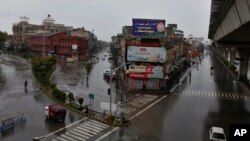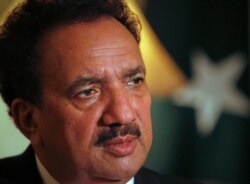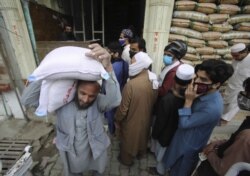As Pakistan faces a spike in reported cases of COVID-19, experts on the South Asian country say the government of Prime Minister Imran Khan will likely fall short of meeting Financial Action Task Force demands in time to be delisted from the FATF’s “gray list."
Pakistani officials say the spread of the global pandemic is beginning to take its toll on their resources. Sen. A. Rehman Malik, former interior minister of Pakistan and chairman of the Senate Standing Committee on Interior, wrote a plea to the FATF Monday, asking for Pakistan's removal from the list in order to devote all its resources and attention to the coronavirus.
“I, therefore, solicit your review of the circumstances, particularly in the light of (the) COVID-19 pandemic and the ensuing humanitarian concerns, to remove the name of Pakistan from the FATF’s Grey List, enabling us to exercise our full potential in collaborating in the global fight against the pandemic,’’ Rehman said in a letter to FATF president Xiangmin Liu.
The so-called gray list limits access to the global financial system for countries that fail to meet their responsibilities to stop terror-funding and money laundering. The independent intergovernmental body added Pakistan to the list from 2012 to 2015, and again in June 2018, over concerns that the country was not doing enough to fight militants operating within its borders.
In February, the terror-funding watchdog said Pakistan had made progress in fulfilling 14 of the 27 action items required for removal from the list. Islamabad was given until June to achieve the rest of the requirements to avoid further ramifications from the member states, including their “business relations and transactions with Pakistan.”
According to Zeeshan Haider, an expert on economics and international affairs based in Pakistan, the coronavirus outbreak in Pakistan has shifted Khan’s focus to the pandemic, making it questionable whether his government can fulfill the FATF’s demands.
“The Pakistani government will try to fulfill the remainder of its obligations, but with the current circumstances due to the coronavirus, Pakistan has very little time,” Haider told VOA, adding that the remaining 13 action items require prosecuting banned terror organization leaders and members before the Anti-Terrorism Court of Pakistan.
900 coronavirus cases
Pakistani health officials Tuesday confirmed that more than 900 people have tested positive for the contagious virus. Most of the cases were reported in areas neighboring hard-hit Iran.
Khan has asked citizens “not to panic” and said the country’s economy could not afford a countrywide shutdown, despite the inevitability of the pandemic spread.
FATF has not yet announced if it will delay its June 2020 plenary meeting or grant extensions to countries that are subject to fulfilling its measures. Haider said it was likely that Pakistan could get leeway for more time, as the international community has turned its focus from battling terror to health and public safety.
Pakistan has to submit its progress report by April 15, ahead of their face-to-face meeting in Bangkok during the second week of May, and the plenary meeting scheduled for the first week of June in Paris.
“This is a very challenging situation for Pakistan to complete recommendations in this time frame,” Mehtab Haidar, a Rawalpindi-based expert on Pakistani economics told VOA.
Pakistani officials were not available for comment on whether they have submitted an official request for an extension or pardon from the FATF.
Measures against terror
Despite the accusations, Pakistan says it has taken serious measures to eradicate terror groups and their financing sources.
A Pakistani anti-terror court last month acted on the country’s most high-profile terror case when it sentenced Hafiz Mohammad Saeed, an Islamic cleric accused of masterminding the 2008 Mumbai terror attack that killed 161 people, to 11 years in prison.
In a tweet, Alice Wells, the U.S. State Department’s principal deputy assistant secretary for South and Central Asia, called the conviction “an important step forward ... for Pakistan in meeting its international commitments to combat terror financing.”
China’s support
Pakistan’s key neighbor that holds the current FATF presidency, China, has acknowledged that Pakistan has made efforts to counter terrorism, despite international pressure, particularly from India, which calls for moving Pakistan to FATF’s gray list.
“China recognized measures taken by Pakistan to combat terrorism financing and appreciated the resolve with which Pakistan implemented the action plan of FATF,” China’s President Xi Jinping said in a joint statement released by Pakistan’s Foreign Office during President Arif Alvi’s visit to China on Tuesday.
Michael Kugelman, a Washington-based South Asia analyst and the deputy director of the Asia Program at the Wilson Center, believes Pakistan has a good chance of getting removed from FATF’s list given the supportive role it played during Washington’s talks with the Taliban to reach a peace deal.
“As a geopolitical factor, Pakistan's help with talks in Afghanistan would certainly be a supportive factor for Islamabad's cause within the FATF,” Kugelman said.
The U.S.-Taliban peace agreement, coupled with Pakistan’s fulfillment of FATF’s major requirements, and the conviction of the leader of the Lashkar-e-Taiba terror group, Hafiz Mohammad Saeed, means Islamabad is closer than ever to be delisted, Kugelman added.
“The FATF membership has made clear that Pakistan has made progress on fulfilling its FATF action plan, so the ball is in Islamabad's court. If it addresses the few remaining action items before the June meeting, it has a good chance of getting removed from the gray list. If it does not, it's likely to remain on the gray list,” he said.
VOA’s Muhammad Ilyas Khan and Aurangzeb Khan contributed to this report from Islamabad.







